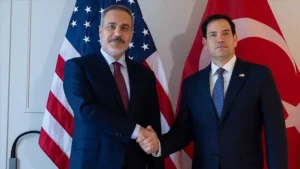Wang Yi, Blinken speak on Palestinian-Israeli conflict

Beijing, The Gulf Observer: Chinese Foreign Minister Wang Yi on Saturday held a phone conversation with U.S. Secretary of State Antony Blinken on the ongoing conflict between the Palestinians and Israel.
During the call made at the request of the U.S. side, Blinken gave a briefing about his visit to the Middle East and talked about Washington’s stance on the conflict, according to a statement on the talks released by the Chinese Foreign Ministry.
Wang, who is also a member of the Political Bureau of the Communist Party of China Central Committee, said the Palestinian-Israeli conflict is escalating and risks “getting out of control.”
He reiterated that China opposes all acts that harm civilians and condemns all practices that violate international law, adding that safeguarding one’s security cannot be realized at the expense of harming innocent civilians.
“There is no way out through military means, and using violence to fight against violence will only create a vicious cycle,” said Wang.
The talks between the top Chinese and U.S. diplomats came one week after the Israel-Hamas conflict broke out on October 7.
The latest round of violence killed over 3,500 people on both sides by Saturday, including 2,215 Palestinians and more than 1,300 Israelis, according to authorities from both sides.
The pressing priority is to end the hostilities and de-escalate to avoid a worsening humanitarian disaster, abide by international humanitarian law and open a humanitarian corridor, and support the United Nations in building international consensus and the Security Council in playing its due role, said Wang during Saturday’s phone call.
He stressed that the fundamental way to resolve the Palestinian issue lies in implementing the two-state solution, establishing an independent state of Palestine, and realizing peaceful coexistence between Palestine and Israel.
“Without reconciliation between the Arab nation and the Israeli nation, there would be no peace in the Middle East,” said Wang.
China calls for the convening of an international peace conference as soon as possible to build broad consensus, he added.
When dealing with international or regional hot-spot issues, major countries should adhere to objectivity and fairness, maintain calmness and restraint, and take the lead in abiding by international law, said Wang.
The United States should make real efforts to play a constructive role and take the issue back on the track of political settlement at an early date, he added.
On his part, Blinken said the U.S. supports the resolution of the issue between Palestine and Israel through the two-state solution, supports the United Nations in playing its role in easing the tensions and providing humanitarian aid, and stands ready to strengthen communication and coordination with China.
The top diplomats also exchanged views on China-U.S. relations during the phone call.
Citing a series of recent high-level contacts between both sides, Wang said there are signs of stabilizing in the bilateral relations, which has been welcomed by the people of the two countries and the international community.
It is hoped that the U.S. can work with China, implement the agreement reached by the two heads of state in Bali, Indonesia, lengthen the positive list and shorten the negative list, effectively respect China’s core interests and major concerns, and take China-U.S. relations back to the track of stable development, he added.
According to Blinken, the U.S. side is ready to work with China to implement the agreement reached by the two heads of state, manage U.S.-China relations responsibly, and promote the stability of U.S.-China relations.


